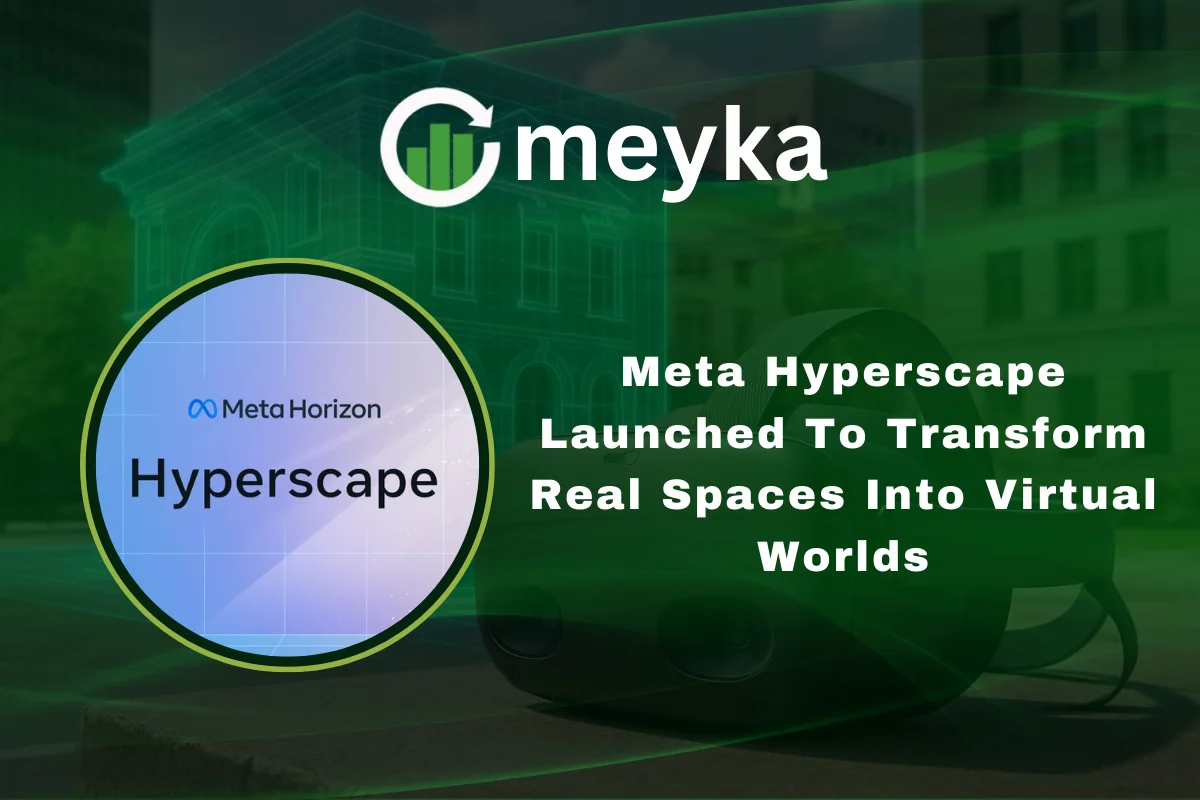Meta Hyperscape Launched To Transform Real Spaces Into Virtual Worlds
The launch of Meta Hyperscape marks a bold step forward in the way we experience and interact with digital spaces. Designed to merge real-world environments with virtual worlds, Hyperscape positions itself as a revolutionary platform in the evolving landscape of immersive technologies.
As Meta pushes deeper into the metaverse, Hyperscape could redefine how businesses, creators, and everyday users connect, explore, and create.
What Is Meta Hyperscape?
Meta Hyperscape is a new platform developed by Meta that allows physical spaces to be scanned, digitized, and transformed into interactive virtual environments. Unlike traditional VR, which often relies on prebuilt 3D models, Hyperscape captures real environments in detail and integrates them into an immersive metaverse experience.
The platform uses advanced AI, spatial computing, and augmented reality tools to map physical locations. Once digitized, these spaces can be used for gaming, social interaction, remote collaboration, or virtual commerce. This fusion of reality and virtual immersion could bridge the gap between digital innovation and everyday life.
Why Meta Hyperscape Matters
The metaverse race is heating up, with major players like Apple, Microsoft, and Google working on extended reality platforms. Meta Hyperscape stands out because it is not just about creating a virtual escape. Instead, it emphasizes the transformation of existing environments into living digital ecosystems.
For example:
- Businesses can convert offices into interactive remote workspaces.
- Retailers can design virtual showrooms that mirror real-world shops.
- Universities can replicate lecture halls and campuses for online students.
- Creators can invite audiences to walk through exhibitions from anywhere in the world.
This adaptability positions Hyperscape as more than just entertainment; it becomes a tool for commerce, education, and productivity.
The Technology Behind Meta Hyperscape
Hyperscape relies on a blend of technologies that are already reshaping digital industries:
- AI and Machine Learning: AI enhances rendering, object recognition, and real-time adjustments in virtual settings. For investors, this connects to the rise of AI stocks, as companies integrating artificial intelligence gain traction in the stock market.
- Spatial Computing: This technology maps real-world environments, enabling seamless transitions between physical and virtual interaction.
- Augmented Reality (AR): AR ensures that physical and digital spaces interact in real time.
- Blockchain Integration: Hyperscape may incorporate digital ownership tools like NFTs, offering new opportunities for creators and businesses.
The combination of these technologies makes Hyperscape more scalable and versatile than most current virtual reality platforms.
Impact on Businesses and Industries
Meta Hyperscape is not only about personal experiences but also about unlocking new business models. Industries that stand to benefit include:
- Real Estate: Realtors can give virtual tours of properties with hyper-realistic detail.
- Retail and E-commerce: Shoppers can step inside a store digitally and interact with products before buying.
- Healthcare: Surgeons could train in digitized operating rooms, improving precision and safety.
- Education: Schools and universities can create immersive virtual campuses for distance learners.
- Entertainment: Artists, musicians, and performers can host live virtual events that replicate real venues.
The global potential is massive, particularly in an era where remote work and online experiences dominate everyday life.
How Meta Hyperscape Could Influence the Stock Market
Whenever Meta introduces a new technology, investors watch closely. Meta Hyperscape could open opportunities in several areas:
- Meta’s Stock Performance: The success of Hyperscape could strengthen Meta’s market position, attracting both long-term investors and speculative traders.
- AI Stocks Growth: Since AI is central to Hyperscape, related companies could also see rising demand.
- Tech Market Expansion: Hyperscape could fuel interest in AR/VR companies, gaming firms, and blockchain developers.
For investors conducting stock research, Hyperscape is a reminder that immersive technology is not just a concept; it’s becoming a mainstream market driver.
Challenges Meta Hyperscape Might Face
While Hyperscape has potential, challenges remain:
- Hardware Dependence: Users may need AR glasses or VR headsets, which limit immediate adoption.
- Data Privacy: Capturing real spaces raises questions about data use and security.
- Competition: Apple’s Vision Pro and Microsoft’s Mesh are strong rivals in the XR space.
- Scalability: Ensuring smooth performance for millions of users requires significant infrastructure investment.
Addressing these concerns will determine whether Hyperscape becomes a global success or remains a niche innovation.
Future Outlook for Meta Hyperscape
If Meta overcomes adoption barriers, Hyperscape could evolve into a central gateway to the metaverse. Instead of replacing reality, it enhances it by turning real places into digital playgrounds for work, play, and commerce.
The platform could also influence how society interacts with the internet itself, shifting from screens and flat interfaces to immersive 3D exploration. Over time, this could transform not just industries but the very way humans interact, learn, and collaborate.
Conclusion
Meta Hyperscape is more than a futuristic experiment; it is a bold step toward a seamless blend of physical and virtual life. With its mix of AI, spatial computing, and immersive design, it offers enormous potential for businesses, investors, and everyday users alike.
As the world adapts to new technologies, Hyperscape could emerge as a leading platform shaping the next digital revolution. From real estate to entertainment, from healthcare to education, its possibilities are endless.
FAQs
Meta Hyperscape is a platform that transforms real physical spaces into interactive virtual environments, allowing users to explore, create, and collaborate in new ways.
It uses AI for object recognition, rendering, and real-time adjustments in immersive environments, making digital spaces more accurate and interactive.
Yes. Businesses across industries like real estate, retail, healthcare, and education can use Hyperscape to engage customers, train staff, and expand services globally.
Disclaimer:
This content is made for learning only. It is not meant to give financial advice. Always check the facts yourself. Financial decisions need detailed research.






